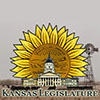President's Perspective – 2024 Session Ends with Possible Reunion on the Horizon
 (May 10, 2024) – The 2024 Kansas legislative session concluded in the early hours of May 1, with a significant focus on a tax reform package. While the tax discussion does not directly impact the Kansas health care delivery system, the Kansas Hospital Association has been monitoring it. The most recent tax package, a key priority for both the House and the Senate, was particularly notable because of the State General Fund's historically high-ending balances.
(May 10, 2024) – The 2024 Kansas legislative session concluded in the early hours of May 1, with a significant focus on a tax reform package. While the tax discussion does not directly impact the Kansas health care delivery system, the Kansas Hospital Association has been monitoring it. The most recent tax package, a key priority for both the House and the Senate, was particularly notable because of the State General Fund's historically high-ending balances.
The House and Senate passed a tax package, similar to previously passed versions throughout the 2024 session, that included:
- Two-tiered tax structure and cut the top bracket to 5.57 percent from 5.7 percent, and the lower bracket to 5.2 percent from 5.25 percent;
- Elimination of the income tax on Social Security;
- Increases in personal exemptions;
- State Property Tax reductions; and
- Acceleration of the elimination of the state sales tax on food.
This version of the tax package reduced the overall price tag from the previously passed $1.558 billion to $1.463 billion. Governor Laura Kelly's Office indicated she may veto the bill and call a special session. A special session would bring legislators back to Topeka, but it does not limit the possible topics that could come up to simplify taxes. Any issue could come up for further discussion, however, bills alive during the regular session of 2024 would die and would require procedural re-introductions in the special session.
As we reflect on the conclusion of the 2024 regular session, it's important to recognize the significant strides made by the legislature. We saw substantial progress on many of the health care policies our hospitals identified as priorities. Some of the notable achievements include:
- Investments in Medicaid Reimbursement Rates: The legislature added $50 million to increase Medicaid outpatient hospital reimbursement rates by 31 percent, $30 million to increase Medicaid physician provider codes by nine percent and $18 million to continue the add-on for Medicaid payments for nursing facilities.
- • Hospital Investments: The legislature added language to the budget bill allowing KDHE to begin the process of increasing the provider assessment from no lower than five percent, up to six percent. The legislature also invested $5.6 million in the Cost Adjustment Factor for Critical Access Hospitals.
- Investments to Support Workforce Challenges: Many investments occurred including adding language requiring supplemental nurse staffing agencies to register annually and report quarterly to KDADS on what their staff is being paid; $1 million for the Kansas Nursing Initiative grant program; $1 million for the Nursing Student Scholarship Program; $10 million for rural family physician residency program expansion; $2.4 million for the Kansas Osteopathic Scholarship; $75,000 for the Family Residency Programs including Smoky Hill Family Residency, Ascension Via Christi and Wesley Family Medicine Programs.
- Behavioral Health Investments: The legislature added $10 million for hospitals that have behavioral health beds and funding to begin construction on a regional psychiatric hospital in Sedgwick County.
- Rural Emergency Hospital Funds: The REH saw pre-emptive language passed by the legislature to allow more hospitals to qualify for REH, and they also added funds for hospitals that have been operating as an REH but didn't previously qualify for the designation.
- Prior Authorization: KHA successfully added language to SB 356 that would require utilization review entities to implement a prior authorization application programming interface as will be required by 2028, per federal law.
- 340B Program: The legislature added language to their budget bill saying that drug manufacturers would be required to honor the 340B program and not limit contract pharmacies through the Kansas Consumer Protection Act.
- Fire Marshall Body Camera Usage: The legislature passed language in HB 2784 that would restrict inspectors from using body cameras in health care facilities for the purposes of inspection.
- KanCare Expansion: For the first time in several years, Medicaid Expansion received hearings in both the House and the Senate.
- Fiscal Sustainability: We were able to defeat the state legislative proposal that would have duplicated federal requirements and added compounding penalties that would have been harmful to the financial sustainability of our hospitals in Kansas.
At KHA, we couldn't do any of our advocacy work without our members, and we thank you for continuing to educate policymakers on how policies impact hospitals and your ability to serve patients in your communities. We look forward to continuing to connect with policymakers whether in Topeka or back home in their districts. As you likely remember, both the House of Representatives and State Senators will be on the campaign trail. Thank you again for your efforts and support on our advocacy agenda!
--Chad Austin